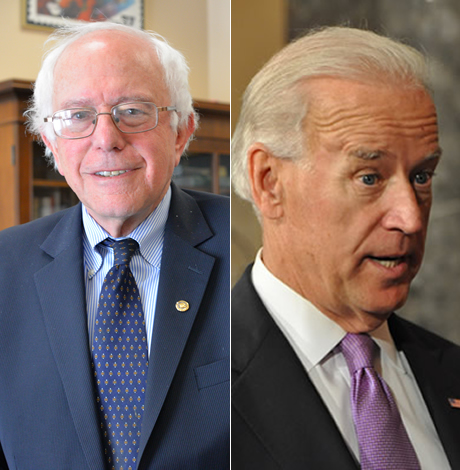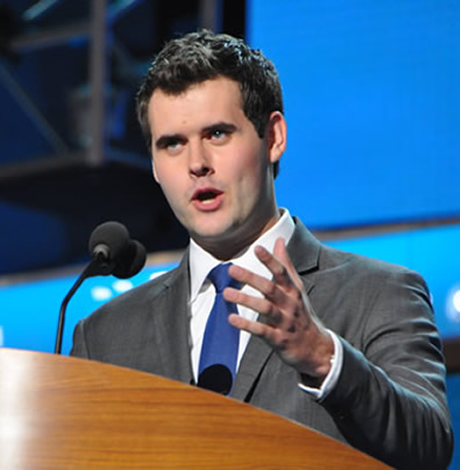National
Vote nears on Boy Scouts gay ban
National Council expected to weigh in next week

All eyes will be on the Boy Scouts of America next week when members of the National Council vote on whether to partially lift a ban that LGBT advocates have sought to remove for at least a decade.
On May 23, 1,400 members of the National Council will gather at the National Annual Meeting in Dallas and take action on the pending resolution, which would allow all youths to participate in the Boy Scouts regardless of sexual orientation.
However, the resolution leaves in place the rule prohibiting openly gay adults from participating as leaders in the Boy Scouts. Further, the proposal maintains youth adhere to a “duty to God” and behavior consistent with the highest level of good conduct.
Zach Wahls, a 21-year-old activist and Eagle Scout — who gained notoriety for speaking on behalf of his lesbian parents before the Iowa Legislature — is the leading voice for a group called Scouts for Equality that is urging the Boy Scouts to adopt the change.
“The resolution that the Scouts are voting on clearly is not fully adequate,” Wahls said. “It still sends, I think, potentially harmful messages to the youth — both gay and straight — about discrimination being OK. That being said, I think it’s absolutely a step in the right direction, which is going to get started going down their path of evolution, as it were. And we all kind of know where evolution goes.”
Wahls said Scouts for Equality for the last two-and-a-half months has been mobilizing grassroots supporters across the country to talk with parents, scout leaders and scout masters about support for changing the gay ban.
“That really can only happen within the scouting community,” Wahls said. “It was through those conversations our incredible grassroots volunteers on the ground that we were able to identify and have conversations indirectly with huge amounts of voting members.”
In February, amid heightened calls for the organization to end its gay ban, the Boy Scouts started a review process to consider the impact of a change. Part of the review consisted of a questionnaire sent to members asking them if they’re OK with certain hypothetical scenarios involving gay scouts and whether they support or oppose lifting the ban.
The decision to partially lift the gay ban in the Boy Scouts may be an attempt to mollify religious groups affiliated with the Boy Scouts. According to the organization’s website, seven in 10 units in the Boy Scouts are chartered to faith-based organizations.
In response to a request for comment from the Washington Blade, the Boy Scouts provided an organizational statement maintaining the issue of allowing openly gay scouts to participate in the organization is a complex one.
“Scouting’s review confirmed that this remains among the most complex and challenging issues facing the BSA and society today,” the response reads. “Even with the wide range of input, it is extremely difficult to accurately quantify the potential impact of maintaining or changing the current policy. While perspectives and opinions vary significantly, parents, adults in the Scouting community, and teens alike tend to agree that youth should not be denied the benefits of Scouting.”
According to recent polls, a majority of the American public wants the Boy Scouts to lift its gay ban. A Washington Post/ABC News poll published on May 9 found that 63 percent back the idea of allowing gay youth to participate while 56 percent oppose the continued ban on participation from gay adults.
Asked whether he’s confident the resolution will be approved, Wahls replied, “As a Boy Scout, our motto is ‘Be Prepared.’ So we’re prepared for any kind of outcome, but we are feeling really, really good about where we are.”
But anti-gay activists are also at work urging the Boy Scouts to maintain its policy prohibiting out youths from participating. An organization called On My Honor is leading these efforts. It didn’t respond to the Washington Blade’s request for comment.
Ending the gay ban in the Boy Scouts is a goal that the LGBT community has long pursued. In 2000, a case known as Dale v. Boy Scouts was argued before the U.S. Supreme Court by Evan Wolfson, now president of Freedom to Marry. He maintained New Jersey’s enforcement of its non-discrimination law to prohibit the Boy Scouts, as a place of accommodation, from banning gay scouts wasn’t a violation of the First Amendment. However, the court determined in a 5-4 decision that current policy for the organization was constitutional.
Texas Gov. Rick Perry (R) has emerged as one of the most high-profile voices in opposition to lifting the gay ban. Last week, as reported by Right Wing Watch, the former Republican presidential candidate appeared on a Family Research Council webcast urging the Boy Scouts to resist the “flavor of the month” by changing its policy.
“The fact is, this is a private organization,” Perry said. “Their values and principles have worked for a century now, and for pop culture to come in and try to tear that up because it just happens to be the flavor of the month, so to speak, and to tear apart one of the great organizations that have served millions of young men — to help them become men and become great fathers — that is just not appropriate.”
Wahls responded to Perry’s position by saying the Texas governor is entitled to his views, but they’re at odds with the American people.
“It’s a free country,” Wahls said. “Gov. Perry can offer his opinion. It doesn’t change the fact that a strong majority of Americans want to lift the ban, and keeping the ban in place is highly detrimental to the future of scouting.”
CORRECTION: An initial version of this article mischaracterized attorney Evan Wolfson’s attorney argument against the Boy Scouts gay ban in 2000. The Blade regrets the error.
Pennsylvania
Malcolm Kenyatta could become the first LGBTQ statewide elected official in Pa.
State lawmaker a prominent Biden-Harris 2024 reelection campaign surrogate

Following his win in the Democratic primary contest on Wednesday, Pennsylvania state Rep. Malcolm Kenyatta, who is running for auditor general, is positioned to potentially become the first openly LGBTQ elected official serving the commonwealth.
In a statement celebrating his victory, LGBTQ+ Victory Fund President Annise Parker said, “Pennsylvanians trust Malcolm Kenyatta to be their watchdog as auditor general because that’s exactly what he’s been as a legislator.”
“LGBTQ+ Victory Fund is all in for Malcolm, because we know he has the experience to win this race and carry on his fight for students, seniors and workers as Pennsylvania’s auditor general,” she said.
Parker added, “LGBTQ+ Americans are severely underrepresented in public office and the numbers are even worse for Black LGBTQ+ representation. I look forward to doing everything I can to mobilize LGBTQ+ Pennsylvanians and our allies to get out and vote for Malcolm this November so we can make history.”
In April 2023, Kenyatta was appointed by the White House to serve as director of the Presidential Advisory Commission on Advancing Educational Equity, Excellence and Economic Opportunity for Black Americans.
He has been an active surrogate in the Biden-Harris 2024 reelection campaign.
The White House
White House debuts action plan targeting pollutants in drinking water
Same-sex couples face higher risk from environmental hazards

Headlining an Earth Day event in Northern Virginia’s Prince William Forest on Monday, President Joe Biden announced the disbursement of $7 billion in new grants for solar projects and warned of his Republican opponent’s plans to roll back the progress his administration has made toward addressing the harms of climate change.
The administration has led more than 500 programs geared toward communities most impacted by health and safety hazards like pollution and extreme weather events.
In a statement to the Washington Blade on Wednesday, Brenda Mallory, chair of the White House Council on Environmental Quality, said, “President Biden is leading the most ambitious climate, conservation, and environmental justice agenda in history — and that means working toward a future where all people can breathe clean air, drink clean water, and live in a healthy community.”
“This Earth Week, the Biden-Harris Administration announced $7 billion in solar energy projects for over 900,000 households in disadvantaged communities while creating hundreds of thousands of clean energy jobs, which are being made more accessible by the American Climate Corps,” she said. “President Biden is delivering on his promise to help protect all communities from the impacts of climate change — including the LGBTQI+ community — and that we leave no community behind as we build an equitable and inclusive clean energy economy for all.”
Recent milestones in the administration’s climate policies include the U.S. Environmental Protection Agency’s issuance on April 10 of legally enforceable standard for detecting and treating drinking water contaminated with polyfluoroalkyl substances.
“This rule sets health safeguards and will require public water systems to monitor and reduce the levels of PFAS in our nation’s drinking water, and notify the public of any exceedances of those levels,” according to a White House fact sheet. “The rule sets drinking water limits for five individual PFAS, including the most frequently found PFOA and PFOS.”
The move is expected to protect 100 million Americans from exposure to the “forever chemicals,” which have been linked to severe health problems including cancers, liver and heart damage, and developmental impacts in children.
An interactive dashboard from the United States Geological Survey shows the concentrations of polyfluoroalkyl substances in tapwater are highest in urban areas with dense populations, including cities like New York and Los Angeles.
During Biden’s tenure, the federal government has launched more than 500 programs that are geared toward investing in the communities most impacted by climate change, whether the harms may arise from chemical pollutants, extreme weather events, or other causes.
New research by the Williams Institute at the UCLA School of Law found that because LGBTQ Americans are likelier to live in coastal areas and densely populated cities, households with same-sex couples are likelier to experience the adverse effects of climate change.
The report notes that previous research, including a study that used “national Census data on same-sex households by census tract combined with data on hazardous air pollutants (HAPs) from the National Air Toxics Assessment” to model “the relationship between same-sex households and risk of cancer and respiratory illness” found “that higher prevalence of same-sex households is associated with higher risks for these diseases.”
“Climate change action plans at federal, state, and local levels, including disaster preparedness, response, and recovery plans, must be inclusive and address the specific needs and vulnerabilities facing LGBT people,” the Williams Institute wrote.
With respect to polyfluoroalkyl substances, the EPA’s adoption of new standards follows other federal actions undertaken during the Biden-Harris administration to protect firefighters and healthcare workers, test for and clean up pollution, and phase out or reduce use of the chemicals in fire suppressants, food packaging, and federal procurement.
Maine
Maine governor signs transgender, abortion sanctuary bill into law
Bomb threats made against lawmakers before measure’s passage

BY ERIN REED | On Tuesday, Maine Gov. Janet Mills signed LD 227, a sanctuary bill that protects transgender and abortion providers and patients from out-of-state prosecution, into law.
With this action, Maine becomes the 16th state to explicitly protect trans and abortion care in state law from prosecution. This follows several bomb threats targeting state legislators after social media attacks from far-right anti-trans influencers such as Riley Gaines and Chaya Raichik of Libs of TikTok.
An earlier version of the bill failed in committee after similar attacks in January. Undeterred, Democrats reconvened and added additional protections to the bill before it was passed into law.
The law is extensive. It asserts that gender-affirming care and reproductive health care are “legal rights” in Maine. It states that criminal and civil actions against providers and patients are not enforceable if the provision or access to that care occurred within Maine’s borders, asserting jurisdiction over those matters.
It bars cooperation with out-of-state subpoenas and arrest warrants for gender-affirming care and abortion that happen within the state. It even protects doctors who provide gender-affirming care and abortion from certain adverse actions by medical boards, malpractice insurance, and other regulating entities, shielding those providers from attempts to economically harm them through out-of-state legislation designed to dissuade them from providing care.
You can see the findings section of the bill here:
The bill also explicitly enshrines the World Professional Association of Transgender Health’s Standards of Care, which have been the target of right-wing disinformation campaigns, into state law for the coverage of trans healthcare:
The bill is said to be necessary due to attempts to prosecute doctors and seek information from patients across state lines. In recent months, attorneys general in other states have attempted to obtain health care data on trans patients who traveled to obtain care. According to the U.S. Senate Finance Committee, attorneys general in Tennessee, Indiana, Missouri, and Texas attempted to obtain detailed medical records “to terrorize transgender teens in their states … opening the door to criminalizing women’s private reproductive health care choices.”
The most blatant of these attempts was from the attorney general of Texas, who, according to the Senate Finance Committee, “sent demands to at least two non-Texas entities.” One of these entities was Seattle Children’s Hospital, which received a letter threatening administrators with arrest unless they sent data on Texas patients traveling to Seattle to obtain gender-affirming care.
Seattle Children’s Hospital settled that case out of court this week, agreeing to withdraw its Texas business registration in return for Texas dropping its investigation. This likely will have no impact on Seattle Children’s Hospital, which has stated it did not treat any youth via telemedicine or in person in Texas; the hospital will be able to continue treating Texas youth who travel outside of Texas to obtain their care. That settlement was likely compelling due to a nearly identical law in Washington that barred out-of-state investigations on trans care obtained solely in the state of Washington.
The bill has faced a rocky road to passage. A similar bill was debated in January, but after coming under intense attack from anti-trans activists who misleadingly called it a “transgender trafficking bill,” the bill was voluntarily withdrawn by its sponsor.
When LD 227 was introduced, it faced even more attacks from Gaines and Libs of TikTok. These attacks were followed by bomb threats that forced the evacuation of the legislature, promising “death to pedophiles” and stating that a bomb would detonate within a few hours in the capitol building.
Despite these threats, legislators strengthened both the abortion and gender-affirming care provisions and pressed forward, passing the bill into law. Provisions found in the new bill include protecting people who “aid and assist” gender-affirming care and abortion, protections against court orders from other states for care obtained in Maine, and even protections against adverse actions by health insurance and malpractice insurance providers, which have been recent targets of out-of-state legislation aimed at financially discouraging doctors from providing gender-affirming care and abortion care even in states where it is legal.
See a few of the extensive health insurance and malpractice provisions here:
Speaking about the bill, Gia Drew, executive director of Equality Maine, said in a statement, “We are thrilled to see LD 227, the shield bill, be signed into law by Gov. Mills. Thanks to our pro equality and pro reproductive choice elected officials who refused to back down in the face of disinformation. This bill couldn’t come into effect at a better time, as more than 40 percent of states across the country have either banned or attempted to block access to reproductive care, which includes abortions, as well as transgender healthcare for minors. Thanks to our coalition partners who worked tirelessly to phone bank, lobby, and get this bill over the finish line to protect community health.”
Destie Hohman Sprague of the Maine Women’s Lobby celebrated the passage of the bill despite threats of violence, saying in a statement, “A gender-just Maine ensures that all Mainers have access to quality health care that supports their mental and physical wellbeing and bodily autonomy, including comprehensive reproductive and gender-affirming care. We celebrate the passage of LD 227, which helps us meet that goal. Still, the patterns of violence and disinformation ahead of the vote reflected the growing connections between misogyny, extremism, and anti-democratic threats and actions. We must continue to advocate for policies that protect bodily autonomy, and push back against extremist rhetoric that threatens our states’ rights and our citizens’ freedoms.”
The decision to pass the legislation comes as the Biden administration released updated HIPAA protections that protect “reproductive health care” from out-of-state prosecutions and investigations.
Although the definition of “reproductive health care” is broad in the new HIPAA regulations, it is uncertain whether they will include gender-affirming care. For at least 16 states, though, gender-affirming care is now explicitly protected by state law and shielded from out-of-state legislation, providing trans people and those seeking abortions with protections as the fight increasingly crosses state lines.
****************************************************************************

Erin Reed is a transgender woman (she/her pronouns) and researcher who tracks anti-LGBTQ+ legislation around the world and helps people become better advocates for their queer family, friends, colleagues, and community. Reed also is a social media consultant and public speaker.
******************************************************************************************
The preceding article was first published at Erin In The Morning and is republished with permission.






















